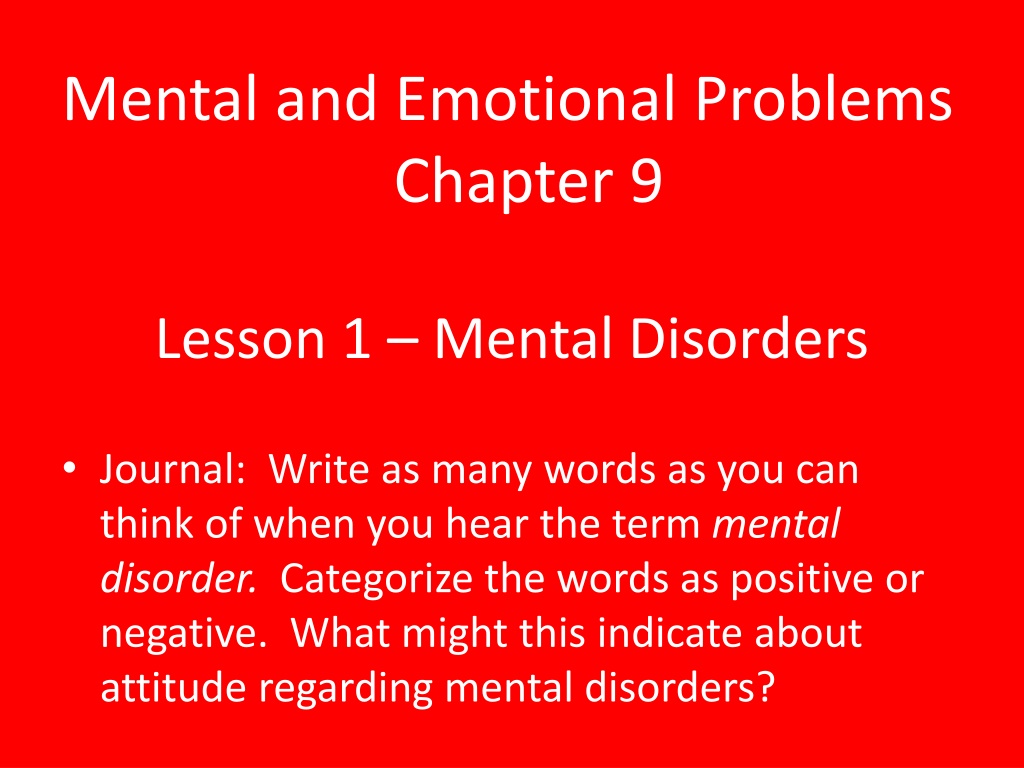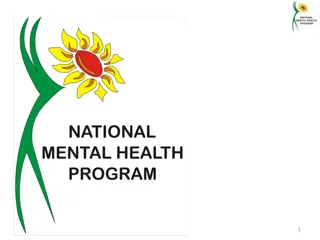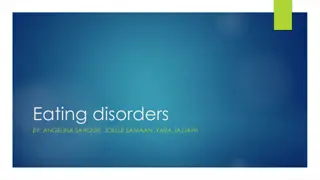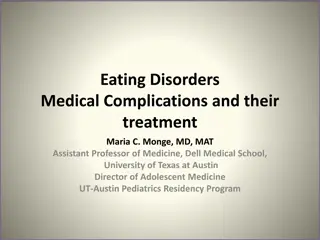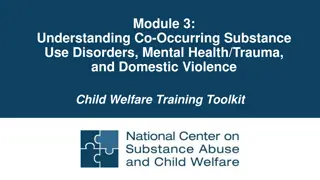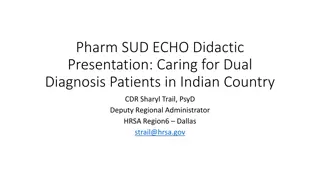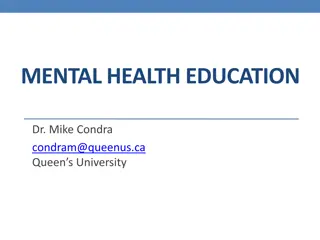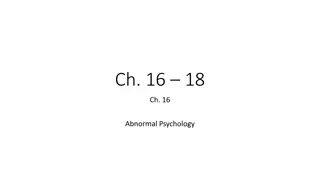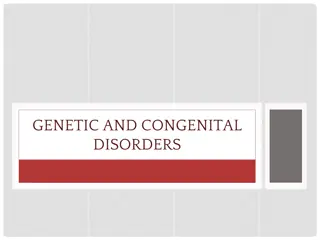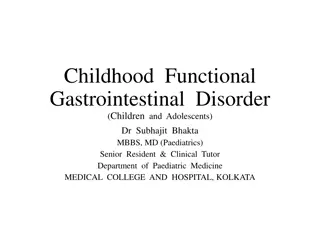Understanding Mental Disorders and Their Impact
Mental disorders encompass a wide range of conditions that affect an individual's thoughts, feelings, and behaviors, hindering their ability to lead a fulfilling life. From anxiety disorders to mood disorders and others like schizophrenia, these illnesses require medical attention and can manifest in various ways, impacting an individual's daily functioning and overall well-being.
Download Presentation

Please find below an Image/Link to download the presentation.
The content on the website is provided AS IS for your information and personal use only. It may not be sold, licensed, or shared on other websites without obtaining consent from the author. Download presentation by click this link. If you encounter any issues during the download, it is possible that the publisher has removed the file from their server.
E N D
Presentation Transcript
Mental and Emotional Problems Chapter 9 Lesson 1 Mental Disorders Journal: Write as many words as you can think of when you hear the term mental disorder. Categorize the words as positive or negative. What might this indicate about attitude regarding mental disorders?
What are Mental Disorders? An illness of the mind that can affect the thoughts, feelings, and behavior of a person, preventing him or her from leading a happy, healthful, and productive life. Mental disorders require medical attention; many involve imbalances in brain chemistry
Types of Mental Disorders Two categories Organic caused by physical illness or injury that affects the brain Functional psychological cause and does not involve brain damage.
An anxiety disorder is a condition in which real or imagined fears are difficult to control A phobia is a strong and irrational fear of something specific, such as high places, dogs, etc Pickles Obsessive compulsive disorder (OCD) traps the affected person in a pattern of repeated thoughts or behaviors Panic disorder involves sudden, unexpected feelings of terror, or panic attacks Post-traumatic stress disorder is a condition that may develop after exposure to a terrifying event that threatened or caused physical harm
Mood Disorders An illness, often with an organic cause, that involves mood extremes that interfere with everyday life Clinical depression feelings of sadness, hopelessness, and despair that last for more than a few weeks and interfere with person s ability to concentrate, sleep, perform at school or work, or handle everyday challenges Bipolar disorder (manic-depressive disorder) marked by extreme mood changes, energy levels, and behavior
Other Mental Disorders Eating disorders Conduct disorder pattern of behavior in which the rights of others or basic social rules are violated Schizophrenia severe mental disorder in which person loses contact with reality
Other Mental Disorders Personality disorder involves thoughts and behaviors that make it difficult to get along with others Antisocial behavior is marked by irritable, aggressive, impulsive, and violent behavior Passive-aggressive personality disorder is marked by uncooperative attitude and behavior
Lesson 2 Suicide Prevention Journal: Write down three danger signs you might detect in someone who is thinking about suicide. Why do you think these are warning signs? What can family and friends do to help a loved one who is exhibiting these signs?
Suicide Risk Factors Suicide is act of intentionally taking one s own life More than 90% of people that commit suicide suffer from depression or another mental disorder, or are abusing alcohol or other drugs Other suicidal risk factors include physical or sexual abuse, history of suicide attempts, or family history of emotional disorders or suicide
Strategies to Prevent Suicide When a teen talks about suicide where it s done in a serious, casual, or even humorous manner, he/she must be taken seriously! Untreated depression is the leading cause of suicide What to do with person contemplating suicide: Initiate meaningful conversation Show support and ask questions Try to persuade the person to seek help Cluster suicides series of suicides occurring within short period of time from same school/community
Lesson 3 Getting help Journal: Why do you think some people may find it difficult to seek help for mental and emotional problems?
Knowing When to Get Help Seek help if any of these feelings persist over a period of days or weeks and begin to interfere with other aspects of daily living: You feel trapped with no way out, or worry all the time Your feelings affect your sleep, eating, school work, job performance, or relationships Your family or friends express concern about your behavior You are becoming involved with alcohol or other drugs You are becoming increasingly aggressive, violent, or reckless
Signs that Professional Help is needed Symptoms that require intervention by a mental health professional include: Frequent outbursts of anger Overwhelming fear, anxiety, or anger at the world Unexplained changes in sleeping or eating habits Social withdrawal Mental disorders may get worse if untreated Things to remember: Asking for needed help is sign of strength, not weakness People with mental disorders often can t get better on own Sometimes, sharing deepest thoughts with stranger is a relief
Lesson 4 Understanding Death and Grief Journal: What words come to mind when you imagine dealing with the loss of someone or something of great value?
Different Kinds of Loss Many kinds of losses can result in emotional distress. Some losses result from rejection, the break-up of a relationship, a death, or a move A strong emotional attachment can make loss deeply painful
Expressions of Grief Coping is dealing successfully with difficult changes in your life. A grief response is an individual s total response to a major loss The grieving process involves these stages of grief: Denial or numbness Emotional release Anger Bargaining Depression Remorse Acceptance hope
Coping with Death Focus on good things, not bad. Avoid focusing on what you could or should have done Mourning is the act of showing grief To help others going through the grieving process, show empathy, take time to listen, share memories and appreciation of person who is gone A counselor or therapist who specializes in grief can help people through the grieving process
Coping with Disaster and Crises Traumatic or sudden events, such as natural disasters, can leave people feeling a range of emotions Coping mechanisms can ease process of recovery: Spend time with other people Get back to daily routines as soon as possible Eat nutritious foods, exercise, get enough rest Do something positive to help your community through the event
